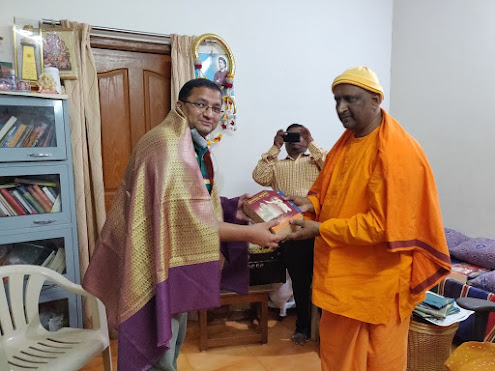Around the end of 2018, a friend of mine took me to a beautiful Ashrama on the outskirts of Bangalore Called the Ramakrishna Yogashrama. It is located on the banks of the Bheemanakuppe lake en route to the famous Big Banayan Tree.
The campus is spread a little over 2 acres. Most of the campus is a plantation with many varieties of mangoes, Banana, Guava, coconut, and turmeric.
Apart from the main sanctum sanctorum for the holy trinity, the Ashram has a Hostel block, A training center, and a pretty big Goshala. Ashram also a small quarters for the staff.
Apart from Spiritual pursuits, the ashram is actively involved in imparting Vocational training. The Ashram also has a residential facility for about 15 kids who are pursuing various levels of School education in the nearby Schools. The schooling, boarding and lodging facilities, and vocational training are all completely free of cost.
 |
| Ramakrishna Yogashrama |
The president of the Ashrama is Swami Yogeshwarananda. A highly educated and dedicated Swamiji has dedicated his life to the cause of spirituality and education. Swamiji gave me a comprehensive view of the campus and the problem. To overcome the problem of electricity, the Ashram had already invested in a solar power project. But unfortunately, it was not working and most of the equipment was burnt because of poor design and installation. Swamiji mentioned that they had invested a lot of money to no avail. He also mentioned that they were getting a huge electricity bill and was hurting them financially; given that they were mainly running on donations.
Now my job was to assimilate the data, find the best solutions in the most sustainable way. I crystallized my thoughts into three goals.
- Make sure that The ashrama does not pay any more electricity bills anymore.
- Make sure that there are no power cuts in the sanctum Sanctorum at any given point in time (Since it also had the student study area) .
- Use all possible components from the old system.
Then we went about designing the solution. From the old system, we could recover about 3 KW of Solar Panels and 6 batteries of 150 Ah, and some cables.
After some discussions with the Swamiji, we came up with the following solutions.
1. A 5 KW Rooftop Solar hybrid system for the main sanctum Sanctorum. This would ensure an un-interrupted power supply and also would ensure zero electricity bill since the excess power could be traded with the electricity distribution company. We could use 4 out of the 6 recovered batteries here.
2. Out of the 3 KW Recovered solar panels, Use 2 KW solar panels to put an On-grid rooftop Solar system on the hostel block.
3. Use the remaining 1 KW solar panels and 2 batteries to put a 1 KW off-grid solar system for the GoShala (Cowshed).
Now that we decided on the solution & system topologies, the next challenge was the funds for the project. Though Ashrama picked up a large chunk of the cost, we still had to find ways to fund some portion of the project.
The funding challenge was overcome by the following means
1. From my organization; we pledged a small sum and some electrical accessories like cables, switches, circuit breakers, etc.
2. The inverter supplier, Studer from Switzerland gave a very good discount on the hybrid inverter.
3. We ran a crowdfunding campaign where we got a good chunk of money. As expected some of our clients made a very generous contribution to the project.
4. Since the On-grid system does not work during power cuts, a disciple of the Ashrama donated a UPS for the Hosel block.
All the challenges were overcome by end of February 2019. The project started rolling. We installed a 5 KW Hybrid system at the sanctum sanctorum. A 2 KW on-grid system came up at the hostel block and a 1 KW Off-grid system came up in the Goshala.
All our staff was very enthusiastic about the project since it had a very good social cause. By the end of March 2019, all the projects were completed and commissioned.
It has been more than 2 years since the project is completed. There is not even one day of darkness at the Ashrama. Not a single rupee is spent on electricity for the last two years. On the other hand, every month the electric grid company is paying a small amount for the Ashrama for the excess energy supplied to the grid. Cows look happy and so are staff who maintain the Goshala. There is 24 x 7 Power at goshala thanks to the off-grid solar power system.
This was not our first social project nor will this be the last. 5 years back, we installed an Off-grid solar system at a remote school in the Western Ghats totally out of funds raised from friends and family. I was told that the small off-grid system that we installed there has helped the school immensely particularly the class X students who stay at school for a few months to prepare for the exams.
These projects reinforce my belief in the power of Solar Energy and I am sure, solar energy is going to make a big socio-economic impact in the world in the coming years.


